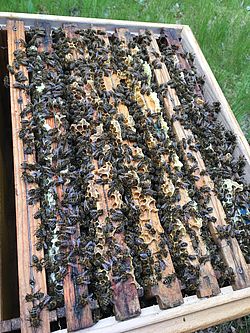
What’s that buzzing sound? Bees at Berentzen
Since May 2019, Haselünne – where the Berentzen Group has its headquarters – has around 70,000 new citizens. The Carniolan honeybees, which are considered to be especially peaceful neighbours, live in a total of three hives.
Why is that important? The problem of bee deaths began to attract a lot of attention last year in particular. The welfare of the worldwide bee population is increasingly threatened by a number of factors, including monocultures, climate changes, pesticides, diseases and parasites. This is a major problem because bees are an essential pillar of our ecosystem: Around 87.5 percent of plants and one third of global food production are dependent on bees and other pollinating insects.
The Berentzen Group too is dependent in many areas on products that can only be produced with the help of bees and other pollinating insects. The fresh juice systems of the subsidiary Citrocasa are entirely dependent on oranges and the subsidiary Vivaris, which produces fruit juices, also relies on the work of bees. Moreover, Berentzen’s fruit liqueurs could not be produced without fruit juice.
Although the “Berentzen bees” cannot solve this global problem alone, the three bee colonies make an important contribution to pollinating the surrounding ecosystem! The local beekeeper association Kreisimkerverband Emsland e.V regularly inspects the beehives to ensure that the bees continue to have the perfect conditions for their important work.
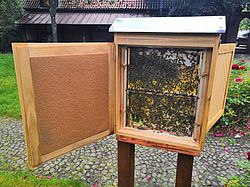
Discovering the work of bees
After the bees were settled in their new home, a place has been created where the work of bees can be observed: In the garden of Berentzen Hof – or more precisely, in the garden of the Dwingelo House – on Ritterstraße in Haselünne, the bees can also be viewed in a show cabinet. Each bee colony has a queen who can also be discovered in the show cabinet. Spectators wanted!
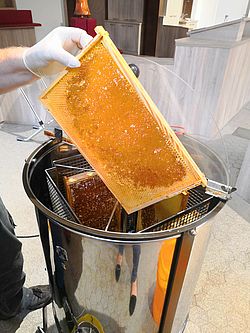
The first Berentzen honey “BEE-viBe”
The first Berentzen honey was harvested just a few months after the bees moved in. A staff survey was conducted to come up with a name for this honey. “Bee-rentzen Group – Appetite for Honey” ranked second while the name “BEE-viBe”, a play on the English word bee, VIvaris and Berentzen, took first place.
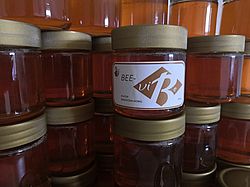
Berentzen honey for a good cause
After it was bottled, Berentzen Group employees were able to purchase the honey for an amount of money of their own choosing. The Berentzen Group doubled the total proceeds and donated them to the project “Water for Life ... Because Water is Life!” You can find more information about this initiative at: https://www.betterplace.org/de/projects/14172-water-for-life-denn-wasser-ist-leben
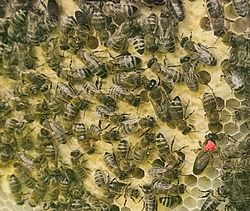
Who will be the new Berentzen Queen 2021?
Every year a bee story starts all over again: Every spring, several queens are born in a bee colony, but only one may stay. When the first young queen hatches, the old queen leaves the nest with part of the colony and founds a new colony. Then, the newly hatched young queens face a bitter struggle that only one survives. The winner becomes the new queen of the bee colony. The queen bee is the only bee in a colony which is able to produce offspring. In the brood cells of the hive she lays up to 2000 eggs a day.
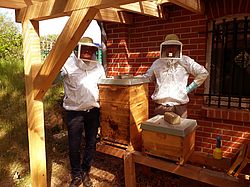
The guardian of the „Berentzen-Bees“: Stephan Burke
Stephan Burke is not only facility manager of the Berentzen Group, but also beekeeper for our busy little bees. What does that mean? Stephan cares for our bees. This involves feeding the insects during the winter period, cleaning and repairing the combs, and harvesting the "Bee-viBe" honey. A particularly essential task is the protection against threatening pests and parasites. Stephan accompanies the bees throughout the year and always prepares them for the new season.

